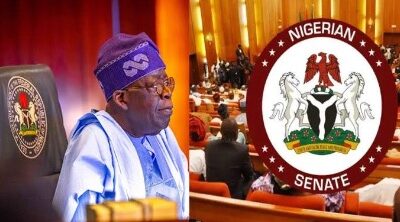Trending
“Your petition claims that Diddy & baby oil banter has caused “irreparable damage to your international reputation.” Another person with more reach and influence just referenced the baby oil; the world is expecting you to arrest him, or the street will interpret it as cowardice.” – Akpi’s lawyer Stan Alieke weighs in on the ongoing beef between Cubana chief priest and Burna boy.

“Your petition claims that Diddy & baby oil banter has caused “irreparable damage to your international reputation.” Another person with more reach and influence just referenced the baby oil; the world is expecting you to arrest him, or the street will interpret it as cowardice.” – Akpi’s lawyer Stan Alieke weighs in on the ongoing beef between Cubana chief priest and Burna boy.

Photo credit: cubanachiefpriest stanalieke/Instgram, Getty images
Trending
Actress Doris Ogala reacts to Pastor Chris Okafor’s wedding, makes fresh explosive claims

Actress Doris Ogala has reacted strongly to Pastor Chris Okafor’s wedding, insisting that the public does not know what is really going on behind the scenes.
In a new outburst following reports of the wedding, Doris alleged that the marriage was forced, claiming the bride was r*ped and got pregnant and that the situation was allegedly used to prevent public exposure. According to her, the bride’s mother is his church’s choir coordinator and allegedly insisted on marriage to avoid scandal.
Doris further claimed that Pastor Chris had another woman he was allegedly set to marry on the 24th, adding that she has chats and videos she says support her claims. She described the situation as darker than it appears and said her decision to speak out was deliberate, despite the personal cost.
She maintained that her earlier confessions and allegations were part of what she described as a spiritual and personal reckoning, stating that she felt compelled to expose what she believes has been hidden.
https://www.instagram.com/reel/DSXz6ZLDMRY/?igsh=YjJyaHJ4bWNxdHg1
Trending
Kwara Govt Confirms Arrested Armed Men Are Miyetti Allah Members, Not Bandits

The Kwara State Government has provided clarification on the viral video showing armed men, initially believed to be bandits, being interrogated by soldiers, a development that had sparked widespread public anger and calls for a state of emergency.
The state official confirmed that the men apprehended were part of a security operation coordinated by the Federal Government, raising fresh controversy over the use of armed non-state actors in counter-insurgency efforts.
Speaking on Informant247, Ibrahim Abdulateef, Senior Special Assistant on Communication to the Governor, confirmed the arrested individuals were members of Miyetti Allah who were incorporated into a Joint Task Force following the deadly September 29 attacks in Ifelodun LGA.
“Under their security setup, they use both recognized officers and a JTF which includes members of Miyetti Allah and local vigilante networks,” Abdulateef said.
The controversy deepened as the state confirmed that a patrol vehicle was provided through the local government chairman “in a bid to empower security forces.”
The government denied the men were arrested as bandits in Kwara. Instead, Abdulateef alleged that after the men completed their assignment, they “absconded with the patrol van” and were subsequently arrested by soldiers “in Auchi, Edo State, not anywhere in Kwara.”
According to Sahara Reporters, the Chief Press Secretary to the Governor, Rafiu Ajakaye, further clarified the identity of an official named in the suspects’ confession: “Victor is a police sergeant attached to the NSA Office,” and not a DSS or Air Force officer as speculated.
Ajakaye disclosed that Victor and the vigilante operatives had since left Kwara State in line with the position of affected local communities, a decision the government said it respected.
He cautioned against sensational reporting of sensitive security matters, describing the situation as a “secrecy dilemma” that requires balance to ensure accountability without undermining national security efforts.
“We are going through a difficult phase in national security emergency. The pain of losing our brothers and sisters and of losing our peace of mind cannot be quantified. Losing a soul is a tragedy — much less many souls,” he said in a WhatsApp post.
He called for calm, urging political elites and community leaders to act with tact and responsibility amid rising tensions.
“But statesmen and patriots aren’t known in time of peace and ease. The elite (who shoulder the burden of guiding the masses) need to handle these whole things with a lot of tact and patriotism,” he said.
“May God guide us, restore peace in our land, expose the evil doers and their collaborators, and make our country stronger, more peaceful, and more prosperous,” the CPS added. “This is a time for careful leadership, not reckless accusations.”
The state’s confirmation of the use of Miyetti Allah members in armed operations comes after previous reports highlighted strong opposition from Kwara residents and local Fulani leaders to an alleged plan by the National Security Adviser (NSA), Nuhu Ribadu, to deploy and arm Fulani herders (Bororos) with AK-47 rifles to fight banditry.
Local Fulani stakeholders had warned that arming non-state actors could worsen insecurity, citing the failure of similar previous attempts and the volatility of migrant herders.
Both the Kwara State Government and Miyetti Allah initially denied any arrangement involving the arming of herders or collaboration with bandits.
Trending
4 Rushed To Hospital as Aircraft Crash-Lands at Imo Airport

By Dan Opara
A light aircraft, Cessna 172, operated by Skypower Express, crash landed on Tuesday night, December 16, 2025, at the Sam Mbakwe International Cargo Airport, Owerri, Imo State, resulting in the hospitalization of four persons.

Eyewitnesses said the aircraft encountered difficulties during landing, lost stability on the runway, and subsequently somersaulted before coming to a halt within the airport premises.
The incident triggered panic among airport personnel and onlookers, although no lives were lost.
Emergency response teams were swiftly deployed to the scene, where the injured occupants were rescued and immediately transported to a nearby medical facility for urgent treatment.
Airport officials confirmed that the four victims are currently receiving medical care, and their condition was described as stable as of the time of filing this report.
The Nigerian Safety Investigation Bureau, NSIB, has commenced a formal investigation into the incident to ascertain both the immediate and underlying causes of the crash landing.
The investigation is expected to focus on the aircraft’s technical condition, prevailing weather conditions, pilot actions, and other operational factors surrounding the occurrence.

Following the accident, airport operations were temporarily disrupted, but normal activities were later restored after safety officials secured the affected area.
Authorities at the airport assured the public that all necessary safety measures are being strengthened to prevent a recurrence.
Meanwhile, stakeholders within the aviation sector have expressed concern over the incident and called for a comprehensive and transparent investigation to further enhance aviation safety standards in the country.
Ekwutosblog gathered the report through monitored information circulating on social media, as prayers and goodwill messages continue to pour in for the quick recovery of those hospitalized, while the public awaits the outcome of the NSIB investigation.

-
Business1 year ago
US court acquits Air Peace boss, slams Mayfield $4000 fine
-

 Trending1 year ago
Trending1 year agoNYA demands release of ‘abducted’ Imo chairman, preaches good governance
-

 Politics1 year ago
Politics1 year agoMexico’s new president causes concern just weeks before the US elections
-

 Politics1 year ago
Politics1 year agoPutin invites 20 world leaders
-

 Politics1 year ago
Politics1 year agoRussia bans imports of agro-products from Kazakhstan after refusal to join BRICS
-
Entertainment1 year ago
Bobrisky falls ill in police custody, rushed to hospital
-
Entertainment1 year ago
Bobrisky transferred from Immigration to FCID, spends night behind bars
-
Education1 year ago
GOVERNOR FUBARA APPOINTS COUNCIL MEMBERS FOR KEN SARO-WIWA POLYTECHNIC BORI













